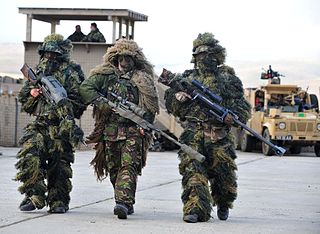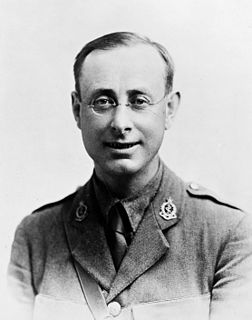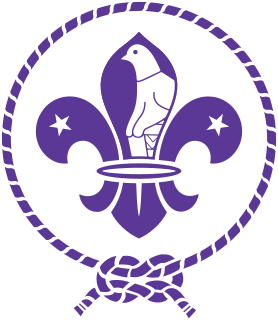
A sniper is a military/paramilitary marksman who engages targets from positions of concealment or at distances exceeding the target's detection capabilities. Snipers generally have specialized training and are equipped with high-precision rifles and high-magnification optics, and often also serve as scouts/observers feeding tactical information back to their units or command headquarters.
Regimental sergeant major (RSM) is an appointment that may be held by warrant officers class 1 (WO1) in the British Army, the British Royal Marines and in the armies of many Commonwealth and former Commonwealth nations, including Australia, Kenya and New Zealand. It is also an appointment that may be held by chief warrant officers (CWO) in the Canadian Forces and warrant officers of any grade in the Singapore Armed Forces, and is a rank in itself in the Irish Defence Forces and formerly in the British Army, Royal Marines and United States Army. Only one warrant officer holds the appointment of RSM in a regiment or battalion, making him the senior warrant officer; in a unit with more than one WO1, the RSM is considered to be "first amongst equals". The RSM is primarily responsible for assisting their commander for maintaining standards and discipline amongst the non-commissioned members and acts as a parental figure to their subordinates.
Staff sergeant is a rank of non-commissioned officer used in the armed forces of many countries. It is also a police rank in some police services.

The British Forces Post Office (BFPO) provides a postal service to HM Forces, separate from that provided by Royal Mail in the United Kingdom. BFPO addresses are used for the delivery of mail in the UK and around the world. BFPO moved from its original base at Inglis Barracks, Mill Hill to its current base at RAF Northolt in northwest London in 2007.

Harold Ackroyd, was a British physician, scientific researcher, army officer and a recipient of the Victoria Cross, the highest award for gallantry in the face of the enemy that can be awarded to British and Commonwealth forces.

The Scout Association of Zimbabwe is a member of the World Organization of the Scout Movement. Scouting in Zimbabwe shares history with Malaŵi and Zambia, with which it was linked for decades.

Military mail, as opposed to civilian mail, refers to the postal services provided by armed forces that allow serving members to send and receive mail. Military mail systems are often subsidized to ensure that military mail does not cost the sender any more than normal domestic mail. In some cases, military personnel in a combat zone may post letters and packages to their home country free of charge. Modern military mail services are provided by most armed forces around the world. In some nations, individual service branches may run their own military mail program.

The Rifle, .303 Pattern 1914 was a British service rifle of the First World War period. A bolt action weapon with an integral 5-round magazine, it was principally contract manufactured by companies in the United States. It served as a sniper rifle and as second line and reserve issue until being declared obsolete in 1947. The Pattern 1914 Enfield was the successor to the Pattern 1913 Enfield experimental rifle and the predecessor of the U.S. Rifle M1917 Enfield.
The .600 Nitro Express is a large bore Nitro Express rifle cartridge developed by W.J. Jeffery & Co for the purpose of hunting large game such as elephant.
The .577 Nitro Express is a large-bore centerfire rifle cartridge designed for the purpose of hunting large game such as elephant. This cartridge is used almost exclusively in single-shot and double express rifles for hunting in the Tropics or hot climates in general and is a cartridge associated with the golden age of African safaris and Indian shikars.

The 76th Infantry Division was an infantry division of the British Army, which was formed in November 1941 and served during the Second World War. It was created when the Norfolk County Division, initially raised in 1940 to defend the Norfolk coast from a potential German invasion, was redesignated. The division maintained the defensive duties that had been assigned to it, prior to it being renamed, until late 1942 when it became a training formation. It was then responsible for providing final tactical and field training to soldiers who had already passed their initial training. After five additional weeks of training, the soldiers were posted to fighting formations overseas. The formation was used as a source of reinforcements for the 21st Army Group, that was fighting in the Normandy campaign. After all available British troops had left the United Kingdom for France, the division was disbanded in September 1944.

The 77th Infantry Division of the British Army was formed in 1941, during the Second World War, from the re-organisation of the Devon and Cornwall County Division. During its existence the division changed roles several times. The division's initial role was coastal defence, protecting Devon. On 20 December 1942, it was converted into a training formation, known as a reserve division. In this capacity, the division provided final tactical and field training for the infantry that had already passed their initial training. After five additional weeks of training, the soldiers would be posted to fighting formations overseas. The division also had a tank brigade attached to provide training in armoured warfare.
The .475 No 2 Nitro Express is a British rifle cartridge developed by Eley Brothers in the early 20th century.

Major Hesketh Vernon Prichard, later Hesketh-Prichard was an explorer, adventurer, writer, big-game hunter, marksman and cricketer who made a significant contribution to sniping practice within the British Army during the First World War. Concerned not only with improving the quality of marksmanship, the measures he introduced to counter the threat of German snipers were credited by a contemporary with saving the lives of over 3,500 Allied soldiers.

The Berlin Infantry Brigade was a British Army brigade-sized garrison based in West Berlin during the Cold War. After the end of World War II, under the conditions of the Yalta and Potsdam agreements, the Allied forces occupied West Berlin. This occupation lasted throughout the Cold War. The French Army also had units in Berlin, called Forces Françaises à Berlin and the US Army's unit in Berlin was the Berlin Brigade.
The .333 Jeffery and .333 Jeffery Flanged are medium-bore rifle cartridges developed by W.J. Jeffery & Co and introduced in 1908.
Colonel Harry Noel Havelock Wild OBE was a British Army officer during the Second World War. He is notable for being second in command of the deception organisation 'A' Force and well as head of Ops. B. He was educated at Eton College.
A loophole is a protected small opening, which allows a firearm to be aimed and discharged, while providing cover and concealment for the rifleman. To prevent detection, the rifle's muzzle should not protrude through the loophole, particularly at night to hide the muzzle flash.









